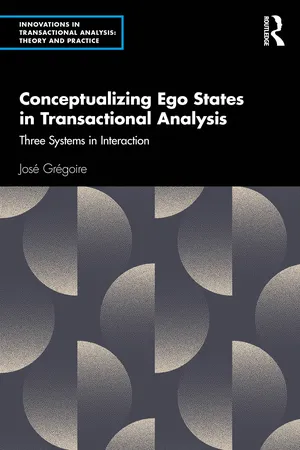
Conceptualizing Ego States in Transactional Analysis
Three Systems in Interaction
- 204 pages
- English
- ePUB (mobile friendly)
- Only available on web
About This Book
Within this book, Grégoire reviews and extends the founding concepts of ego states in Transactional Analysis, starting with Eric Berne's foundational thinking about ego states and then examining and integrating the evolution of subsequent models and thinking.
The ego state theory describes extensive aspects of human existence, exploring phenomena belonging to very diverse dimensions, for example, the person, their inner being, their relationships, their past and present, amongst many others. A conceptualization of the three ego states is newly presented within this book as systems which are constantly in mutual interaction, each with its specific psychological functions: the Child experiences subjectively, the Parent internalizes aspects of the external family and social worlds, and the Adult allows contact with reality. This complex but necessary process is always in evolution and lasts throughout the phases of growth, permeating every aspect of the internal, external and relational life of the person. The book also further explores emotions, grief, groups, relationships and empathy through the lens of ego state theory.
Providing a greater comprehension of Berne's texts and the multilevel concept of ego states, this book will be a valuable resource for transactional analysts, both in practice and in training.
Frequently asked questions
Information
Table of contents
- Cover Page
- Half-Title Page
- Series Page
- Title Page
- Copyright Page
- Contents
- Editor's preface
- Foreword
- 1 Three perspectives on ego states
- 2 Ego states as personality systems
- 3 What is the purpose of each system?
- 4 Growth and personal development
- 5 The Child: The system that experiences life
- 6 The Parent: The system that internalizes
- 7 The Adult: The system that integrates reality
- 8 From disjunction to integration
- 9 Emotions
- 10 The sense of Self
- 11 Integration and relationships
- 12 Co-creativity and relationships
- 13 Communication within the relationship
- 14 The practitioner and the interaction perspective
- Conclusion
- Afterword: Ego states in transactional analysis
- Bibliography
- Acknowledgements
- Index